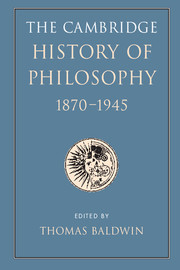Book contents
- Frontmatter
- Contents
- List of contributors
- Introduction
- I 1870–1914
- II 1914–1945
- 8 Logic and philosophy: the analytic programme
- 9 The diversity of philosophy
- 32 The continuing idealist tradition
- 33 Transformations in speculative philosophy
- 34 Realism, naturalism, and pragmatism
- 35 French Catholic philosophy
- 36 Spanish philosophy
- 37 The phenomenological movement
- 38 Heidegger
- 39 Latin american philosophy
- 40 Japanese philosophy
- 10 Knowledge, language, and the end of metaphysics
- 11 Philosophy and the exact sciences
- 12 Mind and its place in nature
- 13 Philosophy and social science
- 14 Ethics, religion, and the arts
- 15 Law and politics
- Biobibliographical appendix
- Bibliography
- INDEX
- References
35 - French Catholic philosophy
from 9 - The diversity of philosophy
Published online by Cambridge University Press: 28 March 2008
- Frontmatter
- Contents
- List of contributors
- Introduction
- I 1870–1914
- II 1914–1945
- 8 Logic and philosophy: the analytic programme
- 9 The diversity of philosophy
- 32 The continuing idealist tradition
- 33 Transformations in speculative philosophy
- 34 Realism, naturalism, and pragmatism
- 35 French Catholic philosophy
- 36 Spanish philosophy
- 37 The phenomenological movement
- 38 Heidegger
- 39 Latin american philosophy
- 40 Japanese philosophy
- 10 Knowledge, language, and the end of metaphysics
- 11 Philosophy and the exact sciences
- 12 Mind and its place in nature
- 13 Philosophy and social science
- 14 Ethics, religion, and the arts
- 15 Law and politics
- Biobibliographical appendix
- Bibliography
- INDEX
- References
Summary
‘CATHOLIC PHILOSOPHY’?
The words ‘Catholic’ and ‘philosophy’ form an uneasy combination which arguably should not exist at all, since it seems to carry the misleading implication that all the authors to whom it refers had an allegiance to Rome, and reduces to a questionable common denominator a number of thinkers whose views were sometimes conflicting. It is therefore preferable to speak of ‘Catholic philosophers’ in the plural, or, if we still insist on using the expression, to put the epithet between cautious quotation marks: ‘Catholic philosophy’.
One thinker to whom the term ‘Catholic philosophy’ could, in a sense, be applied was Maurice Blondel (1861–1949), despite the fact that, in his anxiety to avoid the accusation that his philosophy was an apologetics, he was careful to point out in a revealingly entitled book Le problème de la Philosophie Catholique (1932) that he had not used this problematical expression ‘one single time’ in his earlier classic work L'Action (1893). Even so he wanted to restore it to its original, etymological, meaning of universality, the full significance of which was indissociable from the ecclesiastical dimension. Thus, in the third part of the work, he endeavoured in twenty pages to demonstrate ‘in what sense, with what reservations, and at what price “Catholic” … philosophy is conceivable and achievable’. This was logically in keeping with his Pan-Christianism, which was stated with supreme self-assurance in La philosophie et l'Esprit chrétien (1944), the fourth part of a ‘tetralogy’ of works written with a common purpose, the other parts being La Pensée (1934), L'Etre et les Etres (1935), and a new volume again entitled L'Action (1936–7).
- Type
- Chapter
- Information
- The Cambridge History of Philosophy 1870–1945 , pp. 461 - 468Publisher: Cambridge University PressPrint publication year: 2003



